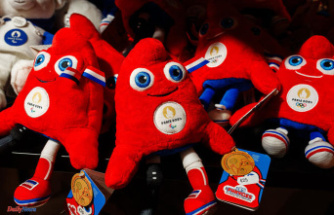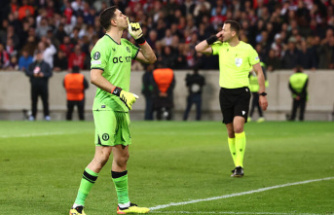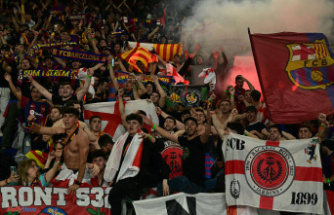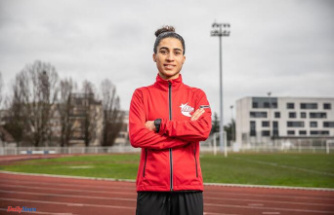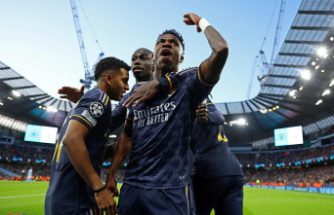With Niklas "Green Mask" Stolze, there will be another German in the cage of the Ultimate Fighting Championship (UFC) next Saturday (7 p.m./UFC Fight Pass). After two defeats, the 29-year-old is now aiming for his first win in the elite league. The native of Magdeburg even switches to the star-studded lightweight division. In an interview with ntv.de, he reveals why he is taking this step, what effects his almost four-month preparation in the USA had and what role UFC veteran Donald "Cowboy" Cerrone plays in it.
ntv.de: Mr. Stolze, in your next fight you will be in the lightweight category - a few kilos under the welterweight you are used to. In the UFC, the lightweight is considered the largest or most difficult division in terms of power density. That sounds like an even bigger challenge. Why did you decide to take this step?
Niklas Stolze: The lightweight is definitely a big challenge - physically and mentally. Because you have to bring the 70 kilograms first. But in terms of talent density and fighting, I think I'll be more comfortable at lightweight. In terms of body type, I fit in there very well and can use my size and range advantages. Those are things that can be done at 170-pound welterweight, but the big plan now was to go lightweight to fight the supposedly smaller guys and get some experience. And then, when the body is no longer able to reach 70 kilos, I would also switch back up to welterweight.
And as of now, is the body still capable of doing this, even though you don't explicitly know the weight class?
Everything is prepared now. Through a test weight cut and data from the other fighters here at the UFC Performance Institute, it was determined that I'm right in the weight range of the UFC lightweight fighters. And I think it will stay that way for the next two or three years.
But making weight remains a big challenge despite the test run?
Yes, the challenge in itself is big and the real challenge is yet to come. Before it was just a test, now it's a weight cut and then a fight - and the performance has to be right. You only know afterwards whether you did everything right. If the body tires more quickly after weight loss or the muscles acidify more quickly - these would all be the result of bad weight cuts. And of course you can only see that in combat. But we are on the right track. I worked out a very good plan with nutritionists at the Performance Institute.
You have already fought one fight at lightweight in your career. So, in the cage, the experience is not entirely alien to you.
That was in 2017, but I used very martial methods to do the weight. And the performance in the Octagon wasn't good either. I can't even remember how I hit that weight. All I know is that I sweated extremely stupidly and almost went blind in my left eye. It was all very unhealthy.
And that works better now because you're working with so many specialists from the UFC?
Yes, in any case. The Performance Institute in Las Vegas, built by the UFC to boost athlete performance, is a major MMA-related diagnostic center. The best in their field work there, the best in the world. And I think that's why weight lifting is easier too.
You've been in the US for four months. So you haven't made any preparations like this before. What have you benefited from the most?
From the knowledge of all the experts, the trainers and the training partners. I just learned so much about fighting and the UFC scene. I was at so many events and was able to make good contacts.
There would also have been the opportunity to train in Germany or in Europe. Was moving to the US for a longer period of time a decision you definitely wanted to make?
Basically, there is simply no way that you could even begin to train in Germany at the level I have been training now. Another reason is that I just needed the distance from our German MMA scene and our German bubble. There are more and more nice events taking place there, but many think they already know how the game is played. From what I've seen in the USA, I can tell that unfortunately the people in Germany aren't quite there yet. And that's why this step to America was so important for me. I needed that for myself because I've just been looking too much at other people for the last few years and I've let that distract me. When the whole Youtube hype started and every fighter suddenly had to be a Youtuber or streamer - we turned ourselves into advertising pillars when it came to sponsors. And that's one of those things that I've been extremely pissed off about in the last two years and that hasn't done me any good mentally. The four months in America were like detox - plus dream life. I got to meet UFC legend Donald Cerrone, among others, and had great preparation and now the fight. That can hardly be weighed in money.
You have just mentioned self-marketing via social media, but to a certain extent there is no getting around it?!
I grew up in the nineties, and it wasn't until I was 13 or 14 that I started having my own mobile phone. I'm more of a nature boy and social media will always be difficult for me to do it so intensively in this form. But I have a friend who really enjoys Instagram and in the near future I'll just let her do it a bit more - as a social media manager, if you want to call it that. I don't need this for myself. I could delete my Instagram today and I would be the happiest person in the world because I'm growing for myself, learning every day and just having a lot of fun. I show what I want to show on Instagram and there will definitely be a YouTube channel for me because - as I said - you just can't get around it. But that won't be three videos a week. I don't need any blatant clicks, I earn my money by fighting and I'm super happy with it.
Apparently Donald "Cowboy" Cerrone took you under his wing a bit. It all seemed very familiar in your Instagram stories. What did you take away from arguably the greatest UFC veteran still in action?
He just sort of took a liking to me and my person. At the highest level of the sport, you see where certain athletes have their priorities. And that's what I saw here. For some it is important that the photos are correct and that everything just looks so perfect. And I'm not like that at all. I don't have to pull out my phone five times and do ten stories with other UFC fighters just because they have millions of followers and maybe that could help me. That is not mine. And that's what "Cowboy" saw. And he celebrated that extremely and maybe even reminded him a bit of himself. Then it just clicked. Because of the preparation for our fights, we always saw each other in the Performance Institute - and then it actually became a real friendship. And what I took away from this experience is to see that they are all human too. Many fighters have set records and pulled off the craziest knockouts, but also ended up with the same little quirks. The same thoughts in my head. Everyone is afraid of losing. Everyone is afraid of not being able to retrieve what they have actually trained. And that doesn't interest us fighters at all at the moment, because we're supposed to enjoy the preparation. "Enjoy The Journey", that's what "Cowboy" always said to me. And I really stuck to that this time. It was like a double preparation at 16 weeks, but it was just fun.
Aside from Donald Cerrone, who do you value most in the new weight class? Is there someone you look up to?
Who also falls into this weight class for me is Max Holloway. He's my absolute favorite fighter. But if you can look up to anyone, it's really only Charles Oliveira at the moment. The guy has so many blatant wins in his career. That's just unbelievable. I trained with him twice at the Performance Institute. The guy is so down to earth and if you can still do it at this level then you deserve everyone's eyes on you and you deserve to be the best lightweight fighter in the world.
They will have their third fight in the UFC on Saturday against Benoit Saint-Denis. The Frenchman lost his UFC debut a few weeks ago. They also lost the last two fights and are both in a similar situation. What kind of fight can we expect there?
I saw what happened in his debut but I think he's a super tough opponent. You'll probably have to shoot him to make him stay down. He has a really good chin, has good grappling and is a southpaw. But that should suit me. I actually expect a pretty clean performance from myself. I look for my shots, try to hit them accurately and with certain points and I can end it with that. When it hits the ground, I'm super excited. Actually, I'd like to hit the ground with him and grapple with him, because I've trained so much Jiu-Jitsu here. I'd love to show that, of course, but the plan is very solid and beautiful boxing. I really want to get in the cage and soak up time. This is very important to me.
If it's on the ground against such a strong Jiu-Jitsu fighter, a mistake - which may still be forgiven in the striking - can be over. Going into ground combat sounds like an interesting but risky plan, doesn't it?
When I used to build up my combat record, we always looked in which area the opponent specialized. Then you tried to avoid this area. In the UFC, you'll face a black belt in karate, judo, jiu-jitsu, or a professional boxer in every fight. It is almost impossible to avoid someone playing to their strengths. You have to prepare so well that you're just 1000 percent fit in all areas. In Germany I also had good sparring partners, but the opponent in the fight was the peak I had to climb. And that's why I went to the deep waters in the USA and rolled with the really good guys. I figured if world jiu-jitsu champions couldn't get me to tap and submit, then my opponent in the cage couldn't either. Then the mindset comes into play again. You have trained with people who are simply better than the opponent in the cage. If I can beat the boys, I can definitely do it against Benoit Saint-Denis.
As you step into the cage, do you visualize how the fight could possibly unfold and end?
You already have a certain process and you want to enforce your game plan somewhere. But what I've learned here, for example, is that you always have to try to adapt. These can also be minor injuries that limit you. In combat, something unforeseen can always happen and you have to deviate a bit from the plan. And whoever adapts better to the combat events usually wins. So I try to have a plan in my head on one side, but leave the other side completely empty. This means that if I just notice that things aren't going the way I wanted, I have to try something else.
Now you are in a position to go into the fight with two losses. Is that a special pressure?
You always have the pressure. If you lose the fight before the UFC, you don't get into the UFC. If wins don't dominate your balance sheet, then they won't take you either. I put a lot of pressure on myself before the last fight and now it's a little less because I'm just going to enjoy it and I want to put on the best fight I can. The UFC can then decide what to do with me after that.
The UFC is also coming back to Europe. There is one event in London in July and another in Paris in September. That would be a great opportunity for another fight.
I don't have London on my radar, it wouldn't be good for my body at all. Paris would be great. That has a special appeal because European fans are different. We just have a different fan culture that you know from football stadiums: howling, being euphoric, chanting and stuff like that. If I beat Benoit Saint-Denis by knockout or submission, I'd get a fight there too - I'm pretty sure of that.
Michael Bauer spoke to Niklas Stolze


